Last year, Prof Stanley Hui Sai Chuen joined the University of Macau (UM) as the college master of Henry Fok Pearl Jubilee College (HFPJC). As a Tai Chi enthusiast, Prof Hui often teaches students to find harmony in their academic and personal lives through the principle of balancing strength and flexibility in Tai Chi. Prof Hui’s transformative journey began in his youth, marked by a boundless energy that propelled him to the Hong Kong gymnastics team. Subsequent academic endeavours abroad made him a prominent figure in education and research. With a teaching career spanning nearly four decades, Prof Hui has nurtured many students and continues to serve as a beacon of inspiration for the younger generation.
Former Hong Kong team coach becomes college master
At a high table dinner hosted by HFPJC last year, students and faculty were in awe of Prof Hui’s surprise. After delivering a speech, Prof Hui turned an airborne backflip with ease, earning a huge round of applause from the students and faculty. Despite being in his sixties, Prof Hui remains agile and energetic. His impressive performance piqued the curiosity of the HFPJC members about this new college master, who has genuine acrobatic skills.
As well as having an excellent physique, Prof Hui has remarkable achievements in the field of sports science. He was a former member of the Hong Kong gymnastics team and later became a coach to nurture young athletes. After completing his doctoral degree in exercise science at the University of Houston, Prof Hui joined the Chinese University of Hong Kong (CUHK). In 2000, he was certified by the American College of Sports Medicine (ACSM) as the health fitness director, making him the only qualified individual in Hong Kong and Macao to assess candidates for the ACSM Personal Trainer/Health Fitness Certifications. In 2001, he was awarded Fellow status by ACSM, becoming the first scholar in Hong Kong and Macao to receive this honour. In 2024, he retired from CUHK and joined UM as college master of HFPJC.
Prof Hui places paramount importance on health. How can one have good health? In addition to a balanced diet and adequate rest, regular exercise is a key element of a healthy lifestyle. Through regular exercise, students can improve their physical wellness, enhance their ability to work under pressure, and improve their mood and concentration. Prof Hui advocates integrating exercise into college life as a means to foster a healthy student lifestyle, which is also in line with the fundamental mission of UM’s residential college education. This was the first ‘mission’ Prof Hui set for himself upon stepping into the role of HFPJC’s college master.
Living like a sunflower
Prof Hui promotes the balanced development of academic studies and physical exercise. He also guides students to discover the enjoyment of exercise, improve their physical wellness, develop a sound character, and strengthen their willpower. UM’s beautiful campus and well-equipped facilities allows Prof Hui to implement his educational philosophy. He often takes brisk walks, jogs, and swims on the campus, setting a good example for the students. He also organises aerobic dance activities at the college, bringing together a group of students who enjoy working out while developing their coordination and sense of rhythm through movement. Furthermore, Prof Hui takes the students cycling every week. They even venture beyond the UM campus to cycle tracks in Taipa, where they appreciate beautiful scenery while cycling and spend a day filled with laughter.
‘I want to convey to students that sports are more accessible than they may realise. Many physical activities do not require professional training and can help us build a strong and healthy body. I encourage them not to sit or stay in static positions all day, and always remember to “get their butt off the chair”,’ Prof Hui says. He also mentions the steep hill that every UM member had to ‘climb’ before reaching the old UM campus in Taipa, and says that walking up that path every day is also a form of exercise.
From the perspective of a physical education advocate, sports not only enhance physical well-being but also boost mood and willpower, making sports activities an excellent approach to character education. Prof Hui advocates incorporating the characteristics of the sunflower into physical education to nurture resilient, proactive and optimistic young people who, like a sunflower that always turns towards the sun, can pursue their aspirations with a positive mindset. In addition to promoting sports events and recreational activities, Prof Hui leads students to engage in cultural experiences, volunteer teaching, and study tours to help them discover their potential, broaden their horizons, and cultivate a spirit of service. ‘I hope that students can acquire more skills, knowledge and experiences, so that they can face the challenges of the era of artificial intelligence with greater competitiveness,’ Prof Hui adds.
Being a guiding light for young students
Last year, Prof Hui retired from CUHK. Instead of enjoying a relaxing retirement, however, he decided to dedicate himself to mentoring students. This starts with his idea of ‘giving back’. As the saying goes, ‘There are many swift horses, but very few who can spot them’. Having been blessed with mentors and opportunities along his professional journey, Prof Hui’s greatest wish is to become a guiding light for students, showing them the way to personal growth by sharing his own experiences.
Prof Hui describes his younger self as a ‘naughty monkey’ bursting with energy, uninterested in schoolwork, lacking clear goals, and inclined to hang around after school. Everything took a twist when, in junior high school, he did a backflip just for fun during a talent show. His teacher spotted his athletic talent and he was later selected for the Hong Kong gymnastics team, marking the first turning point in his life.
The intensive physical training of the gymnastics team greatly improved Hui’s physique and self-discipline, which had a positive impact on his studies and life. ‘Gymnastics requires a high level of concentration, and that helped me to be more focused and efficient in my schoolwork. Through intensive training, I learned how to control my emotions, which greatly improved my ability to cope with the pressures of my studies and life at that time,’ Prof Hui says.
After graduating from college, Hui became a secondary school physical education teacher. Over time, he began to realise his lack of theoretical knowledge and therefore made another life-changing decision—to study for a bachelor’s degree in physical education at Springfield College in the United States, a leading institution in the field of sports studies.
Hui’s diligence and eagerness to learn not only earned him the recognition of his professors, but also allowed him to graduate summa cum laude (the highest honour). In addition, he continued his studies on a scholarship and completed a master’s degree in health and wellness. His exceptional research skills, particularly solving a complex sports science problem using a mathematical model, impressed his supervisor, who later recommended him for a doctoral programme in exercise science at the University of Houston, setting the stage for his academic career.
Reflecting on his days as a student, Prof Hui is particularly grateful for the guidance of his teachers, the support of his classmates, and the opportunities that came his way. All of these experiences not only enriched his knowledge but also shaped his character and gave him the determination to excel in his academic pursuits. Therefore, he aspires to inspire more young minds with his experiences and passion.
Understanding the philosophy of ‘be water’
Prof Hui teaches Tai Chi to a group of students in the training room of the UM Sports Complex. He gives instructions from time to time and encourages students to find their own rhythm and feeling throughout the process, and to internalise the philosophy and wisdom of Tai Chi through each posture and gesture.
Prof Hui insists on holding Tai Chi workshops. He believes that Tai Chi enables people to relax and focus on the present moment through slow and gentle movements. It also helps students find tranquility in the midst of their busy lives. Notably, Tai Chi emphasises the principle of overcoming hardness with softness, akin to the nature of water. As the saying goes, ‘dripping water hollows out stone, not through force but through persistence’. Water can easily adapt to any environment and be contained in any shape. Prof Hui encourages students to be flexible in the face of difficulties, and to solve problems with wisdom rather than violence.
‘Students are easily swayed by comparisons of gains and losses and often feel pressured by their academic performance, self-image, and interpersonal relationships,’ Prof Hui explains. They can learn many lessons from practising Tai Chi, such as not being stubborn and confrontational, but adapting to the environment with flexibility. The wisdom of life lies in humility and adaptability, and this is the message conveyed by the philosophy of “be water”.’ He hopes that students will achieve holistic development and lead healthier and happier lives.
Text: Kelvin U, UM Reporter Qi Zizheng and Huang Kawing
Editor: Gigi Fan
English translation: Winky Kuan
Photos: UM Reporter Yupeng Ying, with some provided by the interviewee
Source: My UM Issue 140
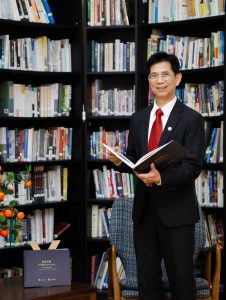
Prof Stanley Hui
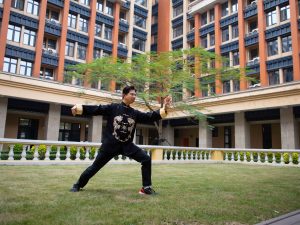
Prof Stanley Hui demonstrates Tai Chi at the college
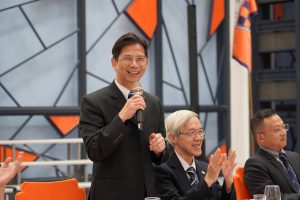
Prof Hui chats and laughs with students and faculty at the college’s high table dinner
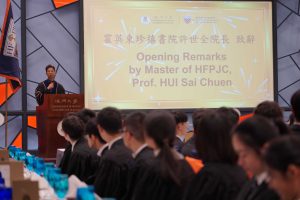
Prof Hui delivers his first speech as college master
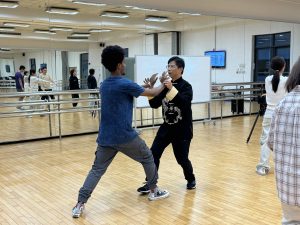
Prof Hui guides students in practising Tai Chi
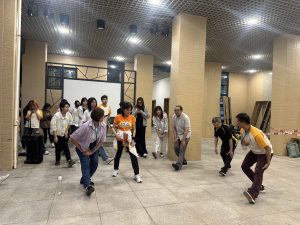
Prof Hui leads students in stretching exercises
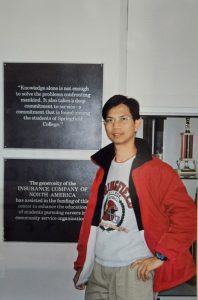
Young Stanley Hui studies in the United States
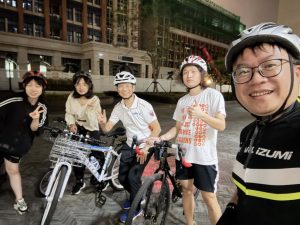
Prof Hui and students go cycling from the college to Taipa
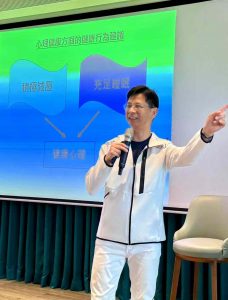
Prof Hui shares knowledge on sports and health at a university seminar